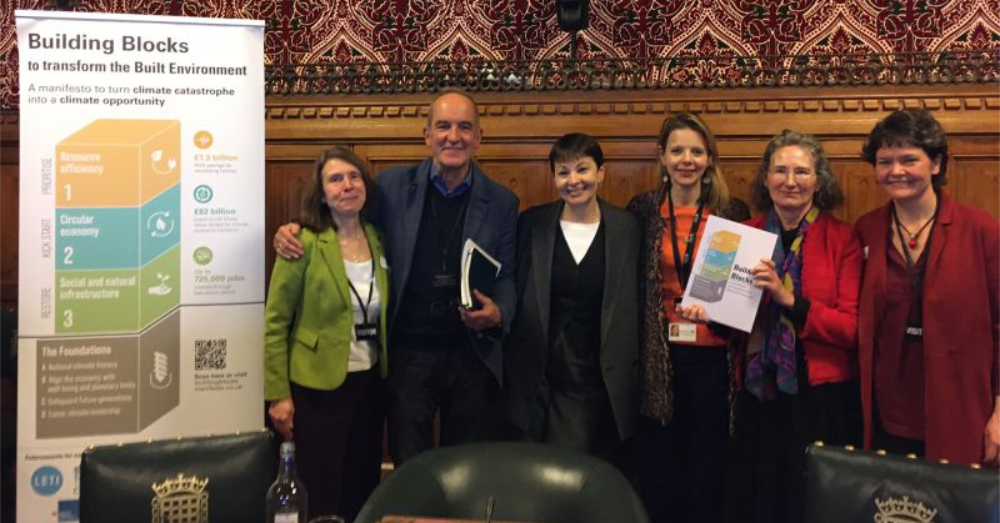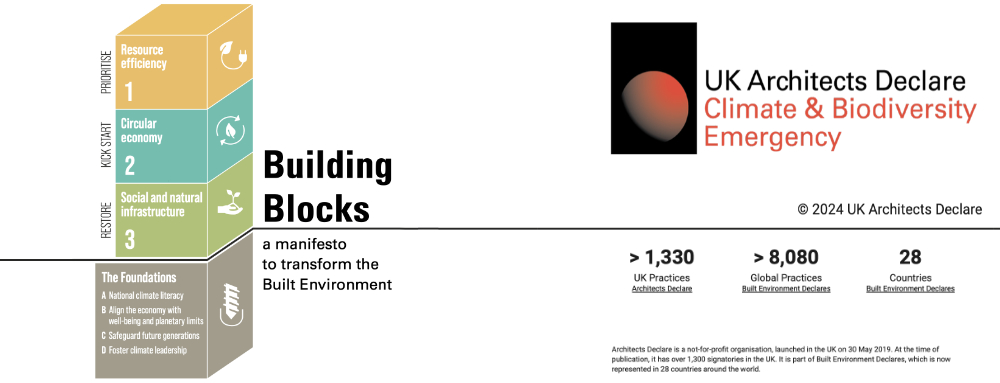Architects Declare present Building Blocks manifesto to parliament

|
| For further information regarding the information below visit Architect's Declare or Building Blocks Manifesto |
Contents |
[edit] Presentation to Parliament
In March 2024 the organisation Architects Declare, including representation from Julia Barfield MBE along with Kevin McCloud (Grand Designs) and Kate Raworth (Doughnut Economics) presented The Building Blocks manifesto at a parliamentary event, hosted and chaired by Caroline Lucas MP. The event called on the next government to commit to five critical policies in their first 100 days in office:
- Align with industry-backed Net Zero Carbon Buildings Standard reporting processes and metrics
- Legislated embodied carbon
- Provide financial incentives that prioritise retrofit & reuse
- Establish the infrastructure to allow the reuse of construction materials at scale
- Create a nationwide green jobs strategy
The proposals developed by Architects Declare and presented in the Building Blocks manifesto were developed following consultation and feedback from a wide spectrum of industry experts, the group strongly encourage parliamentarians to pledge their support for these critical built environment policies ahead of the general election.
As presented in the The Building Blocks manifesto and website policy proposals are grouped into three blocks:
- PRIORITISE Resource Efficiency
- KICKSTART the circular economy
- RESTORE Social and Natural Infrastructure
The group are asking government commit to the policies, and support these with the Foundations to enable the building blocks to succeed:
- Provide Climate Literacy at a national scale
- Align the economy with well-being and planetary limits
- Safeguard future generations ability to act
- Foster climate leadership through reforms and working with local authorities
[edit] Building Blocks: a manifesto to transform the Built Environment
The Building Blocks manifesto provides a policy framework for a regenerative built environment that enables society and nature to thrive – creating jobs, improving health, and restoring the natural world.
The manifesto is structured around three building block themes and their foundations:
[edit] 1 Prioritise resource efficiency
Radically reduce UK’s carbon emissions from the built environment by: regulating whole life carbon emissions to align with a science-based net zero trajectory; improving the efficiency of existing homes; and providing tax incentives.
[edit] 2 Kick start the circular economy
Rapidly transition to a fully circular economy through a nationwide strategy: establishing national material banks; mandating material passports; and prioritising building retention and re-use.
[edit] 3 Restore social and natural infrastructure
Use people and nature centred urban planning to build resilience and social justice; create infrastructure that supports sustainable lifestyles, green jobs and biodiversity; and restore societal and ecological health.
[edit] The Foundations
The Building Blocks must be supported by solid foundations to succeed long-term. This manifesto advocates for action in four foundational areas:
- A Provide climate literacy at a national scale.
- B Align the economy with wellbeing and planetary limits.
- C Safeguard future generations’ ability to act.
- D Foster climate leadership through reforms and working with local authorities.
This article is based on information presented on the Building Blocks Manifesto website and Architects Declare social media postings. For further information visit https://www.architectsdeclare.com/about
[edit] Related articles on Designing Buildings
- Architect.
- Architects Declare.
- Climate Change Act.
- Climate emergency.
- Climate Emergency Design Guide: How new buildings can meet UK climate change targets.
- Households Declare.
- Net zero carbon 2050.
- Net zero carbon building.
- Regenerative design.
- Structural engineers' climate action.
- The architectural profession.
- What we need for the journey to net-zero carbon emissions.
- = External resources =
Featured articles and news
Call for greater recognition of professional standards
Chartered bodies representing more than 1.5 million individuals have written to the UK Government.
Cutting carbon, cost and risk in estate management
Lessons from Cardiff Met’s “Halve the Half” initiative.
Inspiring the next generation to fulfil an electrified future
Technical Manager at ECA on the importance of engagement between industry and education.
Repairing historic stone and slate roofs
The need for a code of practice and technical advice note.
Environmental compliance; a checklist for 2026
Legislative changes, policy shifts, phased rollouts, and compliance updates to be aware of.
UKCW London to tackle sector’s most pressing issues
AI and skills development, ecology and the environment, policy and planning and more.
Managing building safety risks
Across an existing residential portfolio; a client's perspective.
ECA support for Gate Safe’s Safe School Gates Campaign.
Core construction skills explained
Preparing for a career in construction.
Retrofitting for resilience with the Leicester Resilience Hub
Community-serving facilities, enhanced as support and essential services for climate-related disruptions.
Some of the articles relating to water, here to browse. Any missing?
Recognisable Gothic characters, designed to dramatically spout water away from buildings.
A case study and a warning to would-be developers
Creating four dwellings... after half a century of doing this job, why, oh why, is it so difficult?
Reform of the fire engineering profession
Fire Engineers Advisory Panel: Authoritative Statement, reactions and next steps.
Restoration and renewal of the Palace of Westminster
A complex project of cultural significance from full decant to EMI, opportunities and a potential a way forward.
Apprenticeships and the responsibility we share
Perspectives from the CIOB President as National Apprentice Week comes to a close.






















